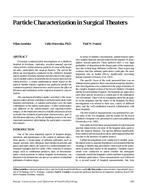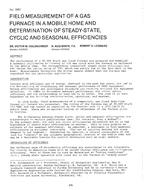Reports on laboratory measurements of the heat transfer to and from water-filled capsules during the freezing and melting processes. The data are presented in a simple form that relates the overall fluid-to-capsule thermal transmittance to the ice fraction of a single capsule or proportion of latent charge of an encapsulated-ice cool store. The encapsulation of water and subsequent freezing and melting introduce certain characteristics that affect heat transfer. They are caused by the peculiar properties of water, including (1) the lack of convection close to the extreme density temperature of 4°C, (2) the propensity to supercool in small volumes, and (3) the increase in specific volume, during phase change from water to ice. The results based on a 0.5 m3 ice store and a single-capsule calorimeter show (1) the large variation in heat transfer during the freezing and melting cycle, (2) the reduction in heat transfer due to supercooling, (3) the significance of internal convection within the capsules, and (4) the possibility of applying the results from a single-capsule calorimeter to a full-scale store provided that dynamic similarity is achieved and the tests are carried out at the same bulk fluid temperatures.
KEYWORDS: laboratory testing, performance, heat flow, measuring, ice storage, properties, thermal conductivity
Citation: Symposium, ASHRAE Trans. 1991, vol.97, part 2
Product Details
- Published:
- 1991
- Number of Pages:
- 9
- File Size:
- 1 file , 1000 KB
- Product Code(s):
- D-18387


